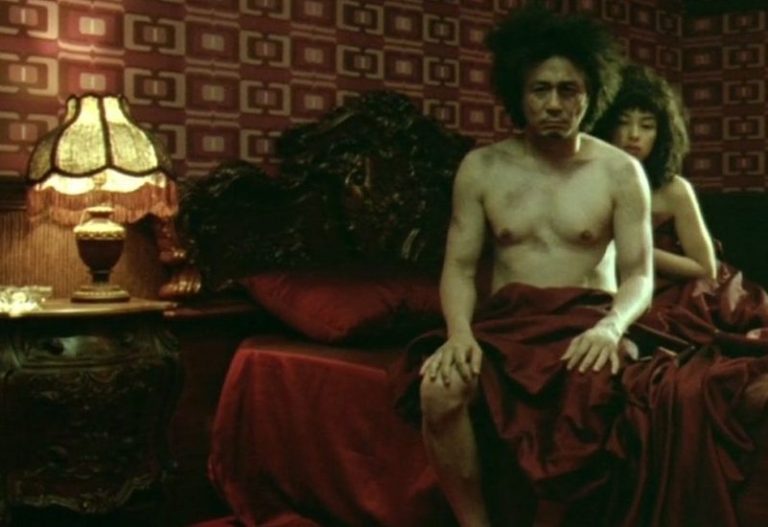microhabitat review
film by Jeon Go-woon (2017)
For a particularly aggravating type of human, policing the purchase of luxury items by those on food stamps is a hobby, bordering on fetish. They glare at their carts, accusatory eyes wide at the forbidden items: lobster, caviar, whiskey, New York Strip Steaks, sushi. These sad, sad people have little to offer the world, so they take it out on poor people.
Review by: James Carneiro | Filed Under: Film Reviews
February 14, 2025
Things aren’t as bad as they used to be. My Mom remembers when there was a separate line for EBT (Employee Benefit Trust), and alarmingly large “stamps” she had to hand to the cashier, as if the internal shame wasn’t already bad enough. Now everyone in the fucking store has to know! Microhabitat’s Miso (Esom) has no such shame. If she has any defining characteristic, it’s flaunting bourgeoisie decorum. She’s a housekeeper, lives in a shoebox, and treats herself to imported whiskey at chic lounges. Every night.
Her living situation is precarious, but meticulously planned out. If her only expenses are rent, cigarettes, and whiskey, she can make ends meet. Maybe even thrive a little. Her square-headed boyfriend Han-sol (Ahn Jae-hong), who draws web comics like it’s 2004, is sweet and supportive. In the film’s first great scene, he returns home and they try to initiate sex, stripping off endless layers of clothing because the unheated apartment is cold as Siberia. Eventually they give up, shivering in their underwear, and return to humdrum evening routine. Capitalism has achieved a new level of atrocity; it’s keeping hot people from fucking. Didn’t Marx predict that in Das Kapital?

Even this threadbare existence is tossed to the winds after Miso’s landlord (saying his landlord raised his rent!) tells her he’s being forced to price her out. She exits the shoebox, every worldly possession in a single suitcase. Miso avoids homelessness by hitting up her old bandmates for places to crash. Director Jeon Go-woon wisely has them run Greater Seoul’s socioeconomic gamut, ranging from alcoholic sadsacks who live in (barely) larger shoeboxes, to pert professional women who own an alarming number of clocks.
So Microhabitat is mainly a tale of Getting The Band Back Together, as Miso untangles What Happened In The Interim and uses housekeeping (both literal and emotional) to try to bring a little joy and spontaneity to the emptiness of their lives. It’s a lot to work with; everyone is so resigned, so withdrawn, prematurely graying and weeping themselves to sleep. Go-woon’s thesis that the Korean Miracle was always hollow, gilding on a rank dog carcass, is compelling. I wouldn’t go so far as to cosign the idea that life is equally bleak for the housekeeper as it is for the CFO, but I do agree that there’s always been a quiet desperation to the lives of comfortable professionals; it’s there if you care to look.
Don’t get it twisted, this is still a very funny movie. It’s Bleakly Funny, which is a legitimate variant of humor pioneered by Kaurismaki and Lars Von Trier. It ceases to be Bleakly Funny when it aims for unrestrained pathos, or during the sequence when Miso visits the home of her former guitarist, a true grand guignol of Stepford Wifery and an arranged marriage scheme which borders on a hostage situation. Most of the film had me chuckling; I was shrieking with laughter while in the Realm of Warped Guitarist Mom. God bless whoever that actress is.

Go-woon’s approach to pathos is naturalistic and effective. Each former bandmate is granted an empathetic soap box to explain What Went Wrong, and seeing their coping mechanisms play out in real time left me impressed with Go-woon’s writing. Perhaps it isn’t quite as devastating as intended, but there were moments when a hot, metallic sting pierced my heart.
Miso survives by cleaning the homes of people who are wealthier than her. She tries to save her soul by scouring the emotional detritus from the lives of her bandmates. She is so giving, so sacrificial, you want to scream at her to think of herself for once. She cooks for strangers, she cooks for friends, she picks up empties from the dens of alkie slackers, she waxes the Jaguars of the people Gangnam Style was pillorying.
From strangers, she receives money. From friends, a sort of trauma transference, feeling cleansed because you made them feel less dirty. She performs all of this labor (and it is back breaking, soul shredding work) because she’s… more caring? Not selfish enough? Content to flaunt certain bourgeoisie strictures while slavishly propping up others? Perhaps it isn’t meant to be completely clear.
Go-woon’s most brilliant innovation with Microhabitat is drawing the all-too-ignored parallels between wage and reproductive labor. For those with further questions, you may ask your housekeeper. Or Mom. Or girlfriend. Or Wendy’s cashier. Or really, any woman that’s even tangentially in your life who can’t afford a maid.

Author
Reviewed by James Carneiro. Initially caught the film bug while cruising for used copies of Bergman flicks/bootleg concert footage at Disc Replay. These days, he’ll review quite anything, though he is partial to Italian neorealism, American underground film, and whoever is using cinema as a method of interrogating power structures. You can follow him on Letterboxd and Twitter.
Two quirky, cynical teenaged girls try to figure out what to do with their lives after high school graduation. After they play a prank on an eccentric, middle aged record…
Following the everyday lives of a group of young theater performers from rural Fenyang, spanning the late 70s to the early 90s in the aftermath of China’s Cultural Revolution…
When her young son Minato starts to behave strangely, his mother feels that there is something wrong. Discovering that a teacher is responsible, she storms…
The Korean New Wave is a transformative period in South Korean cinema that not only captivated audiences at home but also gained international acclaim. Marked by…
Arthouse film refers to a category of cinema known for its artistic and experimental nature, usually produced outside the major film studio system. These films prioritize artistic…
In the mid-20th century, a cinematic revolution was brewing in Czechoslovakia. The Czechoslovak New Wave, film movement characterized by visual experimentation…






